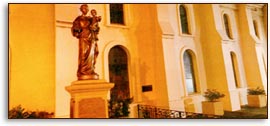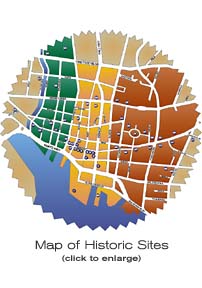
Oldest Catholic cathedral
in isles -- and maybe U.S.
This handsome structure, hidden away at the head of Fort Street, is one of several structures claiming to be the oldest Catholic cathedral in the United States. It's certainly the oldest in Hawaii. Constructed of coral blocks in 1843, it is only a year younger than the Kawaiahao Protestant church. Father Damien was ordained here in 1864.
The first Catholic missionaries in Hawaii arrived in 1827. These six missionaries were members of the Congregation of the Sacred Hearts of Jesus and Mary and of Perpetual Adoration. They dedicated their mission to the patroness of the Congregation, Our Lady Queen of Peace and placed the islands under her protection.
In her honor, these missionaries erected the first Catholic church, but it took more than a decade of wrangling with the Hawaiian government, already under the influence of New England Protestants. The Catholics were even expelled from Oahu at one point. During an abortive French coup in 1839, a manifesto was issued insisting on freedom to worship in the Catholic faith, which stood even after the coup failed.
The cathedral is one of the oldest buildings in the downtown area and stands on land given to the mission by Kamehameha III. Built of coral-stone blocks from the same reef that supplied Kawaiahao Church, both buildings were similar in appearance, although the cathedral had stucco applied over the coral. The insides were stark, with wooden altars and lauhala-mat floors.
The cathedral tower is the third in a series, and the current edition was built in 1917. A bronze weather vane has perched atop the tower for more than a century, and two French-made bells were hung in the tower in 1853. The clock in the tower was installed the year before -- it is the oldest tower clock in the islands -- and was surreptitiously switched en route from France with an older model.
The first pipe organ in the islands was installed in the cathedral in 1847, and the current pipe organ dates back to 1934. It was renovated in 1985.
The statue in the mauka courtyard was dedicated in 1893 and supposedly marks the spot where the first small wooden missionary church stood. Plaques on the sides are engraved in Hawaiian, English, French, and Portuguese: "In memory of the first Roman Catholic Church, Our Lady of Peace 1827-1893." It is a duplicate of an original wooden statue from the 16th century at the Convent of the Sacred Hearts Sisters in Paris.
Hawaii Catholics and the French are also responsible for changing the landscape of Hawaii. Largely covered with grasses and scrub trees until the 1800s, the islands were introduced to the kiawe tree courtesy seeds brought from the Royal Garden in Paris by Father Alexis Bachelot. Although the original kiawe tree next to the church was cut down in 1919, a section of its trunk was preserved.
Our Lady of Peace
Cathedral
Opened: 1843 Architect: Unknown Style: Romanesque Revival Address: 1183 Fort St. National Register: 1972 #72000418 Hawaii Register: 1981
BACK TO TOP |
BURL BURLINGAME / BBURLINGAME@STARBULLETIN.COM
A restaurant-lined mall has grown around Our Lady of Peace.
FILE PHOTO
Our Lady of Peace Cathedral in 1887 was already the oldest Catholic cathedral in the islands, and possibly the United States, when it was built in 1843.
BACK TO TOP |
Quicktime VR Panorama
Click on pictures to view panaromas

BURL BURLINGAME / BBURLINGAME@STARBULLETIN.COM
BACK TO TOP |
See Honolulu City Highlights
Various Honolulu historical organizations have clamored for years to have some sort of survey created of downtown Honolulu's historical sites. The mayor's Office of Economic Development stepped in last year to create order, and 50 locations were chosen as representative of Honolulu's history.
There is, of course, far more history in Honolulu's streets than indicated here, but these sites give the high points and can be visited on a walking tour lasting about three hours.
To commemorate Honolulu's bicentennial, the Star-Bulletin kicks off "Holoholo Honolulu" today, a year-long project to examine these historic properties. For the next 50 Sundays in the Travel section, stories and photographs will illuminate these sites.
But that's just the tip of the architectural iceberg. Viewers can step right into these locations via the magic of QuickTime Virtual Reality, a computer process that allows visitors from around the world to feel as if they're standing right there on the street.
WE'RE ALSO looking for old photographs of these sites to scan for public use. If you have anything, let us know:
Write to:
Holoholo
Honolulu Star-Bulletin
7-210 Waterfront Plaza
500 Ala Moana
Honolulu, HI 96813.E-mail:
bburlingame@starbulletin.com
Every Sunday in the Star-Bulletin Travel section, rediscover the charms of old Hawaii through a tour created by the Honolulu Historic Trail Committee and Historic Hawai'i Foundation and supported by the city's Office of Economic Development. The yearlong project commemorates Honolulu's bicentennial.



